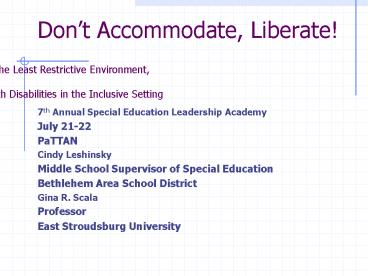Dont Accommodate, Liberate - PowerPoint PPT Presentation
1 / 21
Title:
Dont Accommodate, Liberate
Description:
Effective Instruction for Students with Disabilities in the Inclusive Setting ... Fisher & Frey, 2001; Roach, Salisbury, & McGregor, 2002. Continuing the Reformation ... – PowerPoint PPT presentation
Number of Views:84
Avg rating:3.0/5.0
Title: Dont Accommodate, Liberate
1
Dont Accommodate, Liberate!
OrMaximizing Student Achievement in the Least
Restrictive Environment, Dont Accommodate,
Liberate! Effective Instruction for Students
with Disabilities in the Inclusive Setting
7th Annual Special Education Leadership Academy
July 21-22 PaTTAN Cindy Leshinsky Middle School
Supervisor of Special Education Bethlehem Area
School District Gina R. Scala Professor East
Stroudsburg University
2
Reform or Refrain?
- The challenge to reform our educational system
means - that schools must restructure and coordinate
their efforts and programs to help ALL learners - that students have access to and succeed in the
general education curriculum to meet specific
learning standards and the legislative provisions
of NCLB - Fisher Frey, 2001 Roach, Salisbury,
McGregor, 2002
3
Continuing the Reformation
- Learning Standards
- establish curriculum expectations that identify
the things that learners should know and be able
to do at the various grade levels - provide a framework that guides what is taught
and how student learning is facilitated and
assessed - Salend, 2005
4
Somebodys Watching You!
- NCLB
- ALL learners should be included in high stakes
assessment aligned with state standards - ALL learners demonstrate adequate yearly progress
- Schools are accountable for educating ALL
learners - Translating assessment results into instructional
accommodations that support learning for ALL
students - Unified Education
- Thurlow, 2002 Walsh, 2001
5
Somebodys Watching You!
- IDEA
- FAPE
- LRE
- Zero Reject
6
Effective People
- Be proactive
- Begin with the end in mind
- Put first things first
- Think Win-Win
- Seek first to understand, then be understood
- Synergize
- Sharpen the saw
- Hall, 2003-reference to Stephen R. Covey 7
Habits of Highly Effective People
7
Effective Instruction
- Active engagement
- Moderate to high success rates
- Increased opportunities to learn content
- Direct instruction/supervision
- Scaffolded instruction
- Critical forms of knowledge
- Organizing, storing, retrieving knowledge
- Strategic instruction
- Explicit instruction
- Generalization of skills
- Ellis, Worthington, Larkin (1994)
8
Education-Special or General
- Activity Where would these features occur?
Identify S, G, or B - ____ Individualize assessment planning
- ____ Specialized instruction
- ____ Intensive instruction
- ____ Goal-directed instruction
- ____ Research-based instructional practices
- ____ Collaborative partnerships
- ____ Student performance evaluation
- Heward, 2003 Crockett, 2002
9
Items to Consider
- Positive Behavior Support
- School
- Classroom
- Individual
- Instructional Models
- Explicit Instruction Model (di)
- Direct Instruction Model (DI)
- Strategy Instruction Model
- Collaborative Teaching
- Co-teaching
- Communication
10
Items to Considercontinued
- Progress Monitoring
- Evaluation
- Instructional Decision Making
- Teaching Strategies
- Universally Designed Instruction
- Scaffolded Instruction
- Inquiry Method
- Feedback
- Social Skill Instruction
11
And the List Goes On
- Activity Brainstorm other Best Practice
Options
12
Accommodations
- Size
- Time
- Input
- Output
- Difficulty
- Participation
- Level of Support
- Alternative Goals
- Substitute curriculum
- Ebeling, Deschenes, Sprague 1994
13
Instructional Methods
- Teacher-centered Approaches
- Lecture-discussion
- Demonstration
- Direct Instruction
- Learner-centered Approaches
- Discussion
- Discovery learning
14
Instructional Methods
- Teacher-centered approaches
- Lecture-discussions
- Demonstration
- Direct instruction
- Marshall, 1992 Stoddard, Connell, Stgofflett,
Peck, 1993
- Learner-centered approaches
- Discussion
- Discovery learning
- Cooperative learning
- Learning centers
- Role-play
- Simulation-problem-based/inquiry
- Eggen Kauchak, 2001
15
Collaborative Teaching
- Ongoing staff development
- Communication skills
- Working with others
- KNOW yourself
- KNOW your partner
- KNOW your student
- KNOW your stuff
- Keefe, Moore, Duff (2004)
16
Progress Monitoring
- Ongoing
- Collect analyze
- Instructional decision making
- Standards/objectives
- Making data collection decisions
- Determining data collection tools schedules
- Representing that data visually
- Evaluating the data
- Making instructional adjustments
- Communicating progress
- PaTTAN
17
Positive Behavior Support
- Prevention
- Uses programmed change
- Proactive
- Based on principles of ABA
- A teaching plan
- Effective in replacing inappropriate with
appropriate behaviors
- Fosters school-wide support
- Includes the student in responsibility
- Promotes social skills
- Teaches behavior control strategies
18
Social Skills
- Infuse in academic curriculum
- Bibliotherapy
- Video therapy
- Forgan Gonzalez-DeHass, 2004
19
Inquiry
- Demonstrate personal inquiry skills
- Trust and change in teaching approaches
- Patience, flexibility, resourcefulness
- Facilitates student directed activity
- Pursues questions and constructs knowledge
- Real world applications
- Alternative methods and POV
- Reflection
- Maroney, Finson, Beaver, Jensen 2003
20
Evaluation
- Observe student work frequently
- Continuous
- Moving around the classroom
- Have discussion with students continuously
- View behavior as indicators of understanding
- View teachers as not the sole problem solver
- Have high expectations for all students
- Alexandrin, 2003
21
Feedback
- Instructive Feedback
- Elaborated Feedback
- Written commentspersonally designed
- High quality
- Increases instructional efficiency
- Planned
- Konold, Miller, Konold 2004































